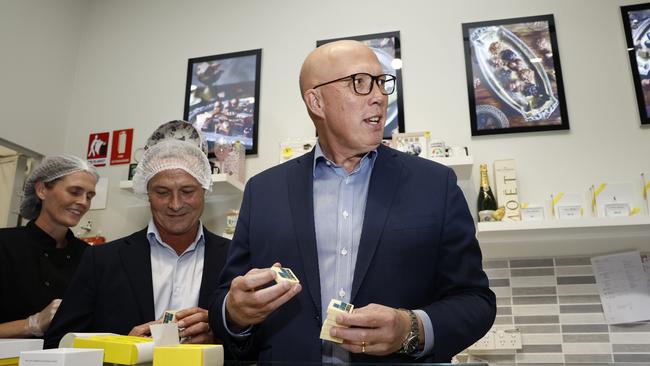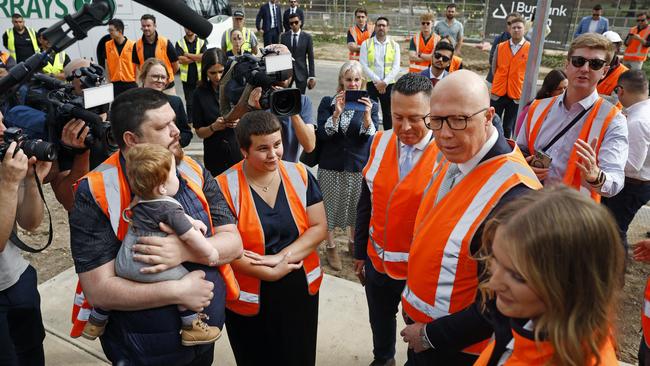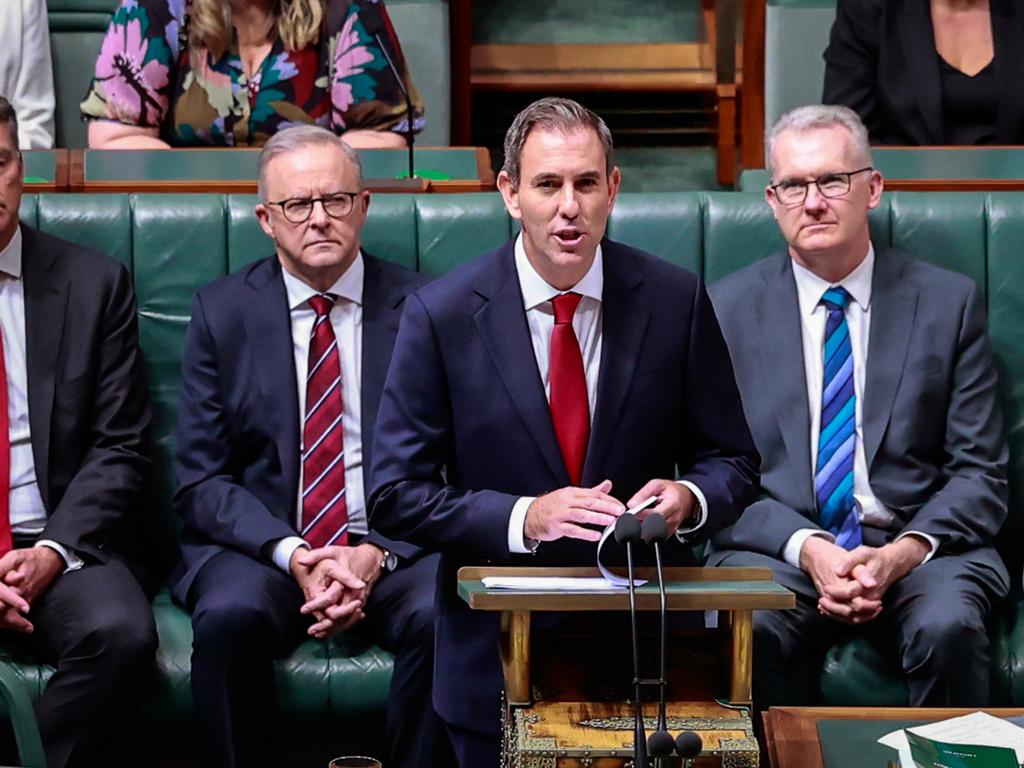Big spending Peter Dutton’s income tax flex is all show, no go
If bracket creep is an ‘economy killer’ and the budget is broken, why wait years to fix this failure in our tax system?

Peter Dutton has finally popped out a thought bubble of a reform idea about personal income tax. When the budget position allows, the Opposition Leader has an “aspiration” to index the tax scales so that wage inflation doesn’t keep pushing up the average tax paid by workers.
“I want to see us move as quickly as we can as a country to changes around personal income tax, including indexation, because bracket creep, as we know, is a killer in the economy,” he told Paul Kelly and Dennis Shanahan.
Dutton declared bracket creep “stifles productivity and entrepreneurialism and hard work”. “But we need to do it at a time where the budget can afford to do so,” he continued. “It would be an aspiration of our government to achieve that because it provides equity in the tax system and it is costly to do so.”
This was the signal beamed into the sky that fiscal conservatives and low-tax Liberals have been waiting for from a leader whose campaign policies have tumbled out with a jaundiced tinge of populist yellow and a hefty price tag. Don’t forget, this is the team that has vowed to repeal the (extremely modest and delayed) tax cuts Labor rushed through the parliament in budget week. Those legislated tax “cutlets” at the bottom threshold are a bit of housekeeping, but at least will return fiscal drag over the first two years.
As I wrote last week, economic modeller Chris Murphy has calculated that automatically indexing the tax brackets to price growth in every budget would see today’s average tax rate of 24.3 per cent rise to 25.5 per cent by 2036. Without indexation it would rise to an all-time high 28.1 per cent, squeezing living standards and diminishing incentives to work and save.
Murphy, a visiting fellow at the Australian National University, says indexation would mean governments would have to be more transparent, efficient and fairer in how they fill the gap between spending and taxing. Treasury, to say the least, is not a fan. Treasury secretary Steven Kennedy has argued indexing income tax thresholds is “procyclical” and would make inflation worse.
In 1976 the Fraser government introduced indexation (adjusting the tax scales by the CPI minus the impact of indirect taxes). It was short-lived, soon cut to a half measure, and ditched in 1981, a political and economic failure, as Kelly recounted in February last year. Politicians ceded control of taxation and were robbed of the ability to announce vote-buying “tax cuts” (when all they were really doing was handing back bracket creep).

But if, as Dutton declares, bracket creep is an acknowledged “economy killer”, productivity growth is shot and living standards are stagnating, why wait? Plus, if it’s something to do when the budget is in rude health, why keep making it worse and adding to debt with bad ideas, like the one about using future revenue upgrades to load up the pork barrel for bush boondoggles?
The Coalition’s housing policies are a mix of the good, the bad and the ugly. The $5bn to spend on roads, sewerage and water to free up land for housing lots at least focuses on supply; but 500,000 building blocks is ambitious and not the same as half a million new homes.
The tax deduction for first homebuyer mortgage interest on the first $650,000 of a loan for new homes may add at the margin to the housing supply as opposition Treasury spokesman Angus Taylor insists. But there isn’t a reputable economist who endorses this move. It will pump up demand and home prices and therefore household debt levels. Ditto the withdrawal of $50,000 from superannuation.
Independent economist Chris Richardson says the cost of mortgage deductibility is likely to be bigger than the $1.25bn claimed. Imagine trying to take that estimated $12,000 a year lurk away after five years, just when school fees and other expenses kick in.
Both major parties are accelerating the move away from what was once a highly targeted system of direct transfers for pensions and unemployment benefits. In this new social order, Canberra now spends more on in-kind demand-driven services, such as aged care, childcare and the NDIS. Add in the range of non-means tested goodies such as energy rebates, fuel excise relief, bulk-billing incentives for GPs, cheaper medicines, and Labor’s student debt forgiveness and it starts to look like Howardism – no group left behind!

Remember, all these new promises are on borrowed money. We’re staring down the barrel of a decade of deficits, rising debt and higher interest costs. That’s before we take into account the emerging national security challenges and more self-sufficiency in defence.
We’ve long celebrated the Australian hybrid: Euro-style social services, off a relatively low tax take. The nation is becoming more expensive to run. Yet proposing spending cuts or tax rises is a path to political oblivion. These days our leaders are rarely brave and hardly ever crazy.
But they are unmoored, pretending we can somehow keep having it all in a world less friendly to our business model, where our productivity is abysmal, our regulations stifling everything from home building to innovation, and our tax system not fit for purpose (other than for those planning their way around it).
Genuine tax reform is not on the ballot this year, although who knows how much influence a pushy crossbench will yield in the aftermath of May 3. Less than one-quarter of voters surveyed by JWS Research believe our tax system is working well and does not require substantial reform.
As in other areas, Labor has offered only baby steps on tax repair. Yet Holy Thursday’s indexation surprise won’t fix the toil and trouble of hapless taxing and wasteful spending. Nor will Dutton’s porous pledges about restoring fiscal rules (without actual numbers) gain the confidence of voters when he splurges their money on half-baked housing policies and failed tax breaks.
The Coalition’s mix of talk therapy, cash bribes, me-too spends and appeals to brand Howard & Costello won’t melt into a broth of core conviction at this late stage of a three-year battle for hearts and minds. Aspiration can be dangerous amid the fire burn and cauldron bubble of an election campaign.






